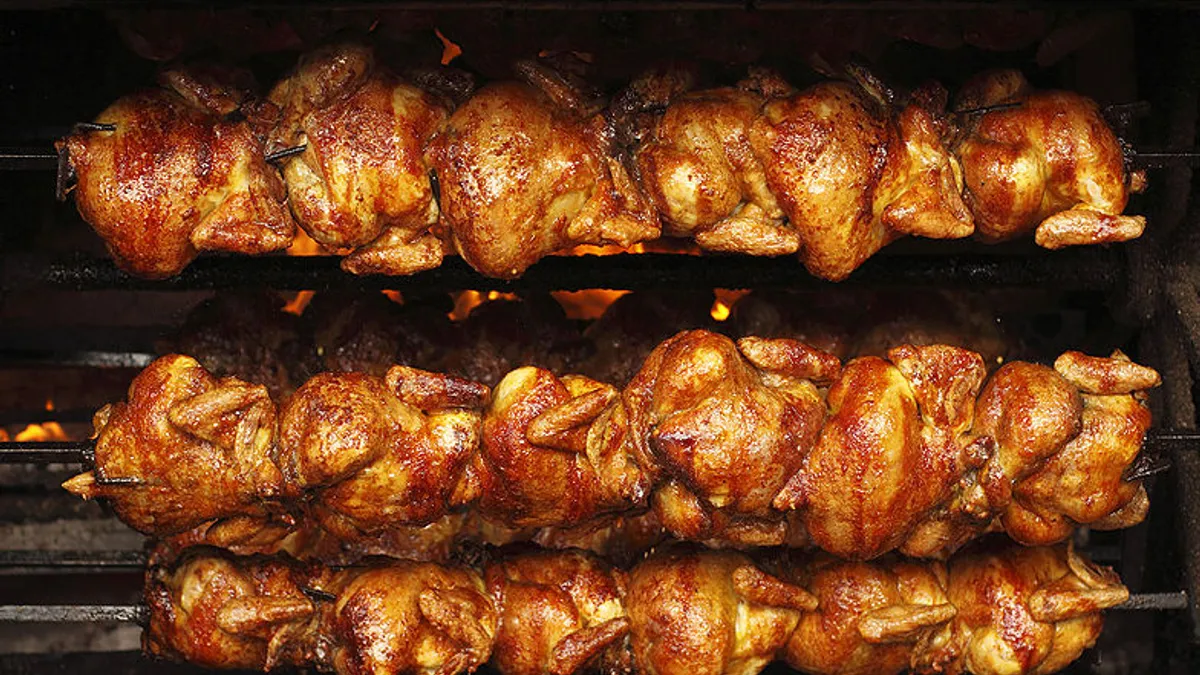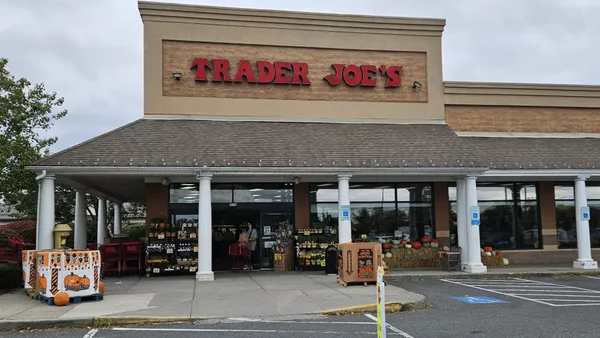Dive Brief:
- Current and former top executives at Pilgrim’s Pride and Claxton Poultry Farms were indicted for conspiracy to fix prices for chickens sold to grocers and restaurants from 2012 to 2017, according to the Department of Justice.
- A federal grand jury in Colorado indicted Pilgrim's CEO Jayson Penn and former Pilgrim’s Vice President Roger Austin as well as Claxton's President Mikell Fries and Scott Brady, a vice president, on Wednesday.
- These are the first charges in the DOJ's ongoing antitrust investigation into the chicken industry.
Dive Insight:
Accusations of price-fixing and collusion have followed the chicken industry for years and now executives at the second-biggest chicken producer in the U.S. are facing criminal charges.
These indictments could mean more charges are coming for other chicken producers accused of fixing prices. Stock prices for Tyson Foods, Pilgrim's Pride and Sanderson Farms all dropped Wednesday afternoon.
The DOJ's investigation into the chicken industry was disclosed last year when it intervened in a major price-fixing lawsuit filed in 2016. The lawsuit accused chicken companies, including Pilgrim's Pride, Perdue Farms, Tyson Foods and Sanderson Farms, of conspiring to inflate broiler chicken prices. The DOJ's attorneys intervened so they could gather evidence and pause additional evidence-gathering to protect a grand jury’s probe.
The DOJ followed up by subpoenaing Tyson, Pilgrim’s, Sanderson and other poultry producers, according to The Wall Street Journal. Legal analysts told sister publication Food Dive then that the intervention could mean the government was on the verge of bringing criminal charges, and now it has done just that.
"Executives who cheat American consumers, restaurateurs, and grocers, and compromise the integrity of our food supply, will be held responsible for their actions," Makan Delrahim, assistant attorney general of the DOJ's Justice’s Antitrust Division, said in a release.
For years, price-fixing claims against chicken producers have been escalating. The poultry companies have faced multiple similar lawsuits, as well as an investigation by the U.S. Securities and Exchange Commission and the scrapping of the controversial Georgia Dock price index.
The chicken industry is largely controlled by just a few big companies. The five biggest companies dominate 61% of chicken production in the U.S., according to Watt Global Media data cited by The Wall Street Journal. When it comes to the $30 billion broiler market, about 90% is controlled by Tyson, Koch Foods and Perdue Farms.
Pilgrim’s Pride, which is majority owned by JBS USA, represents about 17% of the U.S. market and produces about 13 billion pounds of chicken annually, while Claxton processes about 300 million pounds of chicken a year. Despite years of consolidation and antitrust allegations, the companies involved have strongly denied accusations of price-fixing.
These accusations have been common in the food industry in recent years with lawsuits also filed involving dairy, tuna and pork.
After an investigation into price-fixing on tuna, Chicken of the Sea settled with Walmart in 2018, and Bumble Bee pleaded guilty a year ago as part of the DOJ's investigation. In 2019, StarKist also settled antitrust claims with Walmart for $20.5 million and former Bumble Bee Foods CEO Chris Lischewski was found guilty of conspiring to fix prices. He could be sentenced up to 10 years in prison and receive a $1 million fine. A similar fate could happen to the chicken companies and executives involved in these latest charges.
Peter Carstensen, a professor of law emeritus and an antitrust expert at the University of Wisconsin-Madison's Law School, told Food Dive last year that if the DOJ brings charges, the consequences to these chicken companies could be severe.
"If the government decides to bring a criminal case, then the chicken companies will face both significant criminal fines, and if particular individuals are strongly implicated, they could face jail time and for a corporate executive, that's got to be pretty scary," Carstensen said. "That would also make the settlement of these cases a lot easier for the plaintiffs on the merits."














